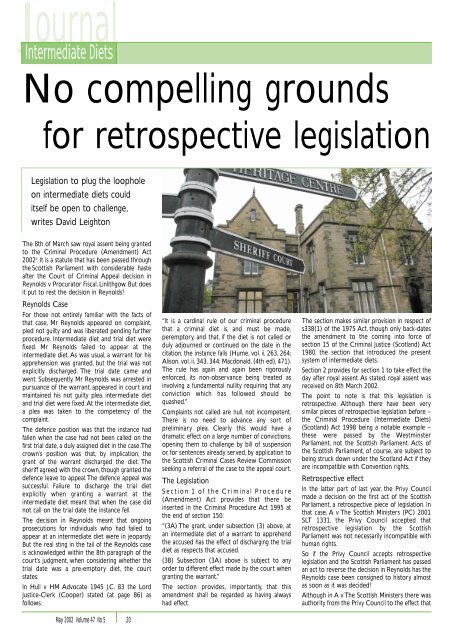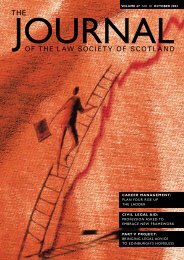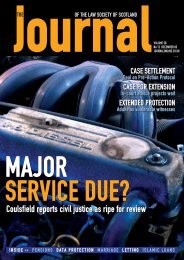OF THE LAW SOCIETY OF SCOTLAND - The Journal Online
OF THE LAW SOCIETY OF SCOTLAND - The Journal Online
OF THE LAW SOCIETY OF SCOTLAND - The Journal Online
Create successful ePaper yourself
Turn your PDF publications into a flip-book with our unique Google optimized e-Paper software.
<strong>Journal</strong><br />
Intermediate Diets<br />
No compelling grounds<br />
for retrospective legislation<br />
Legislation to plug the loophole<br />
on intermediate diets could<br />
itself be open to challenge,<br />
writes David Leighton<br />
<strong>The</strong> 8th of March saw royal assent being granted<br />
to the Criminal Procedure (Amendment) Act<br />
20021 . It is a statute that has been passed through<br />
the Scottish Parliament with considerable haste<br />
after the Court of Criminal Appeal decision in<br />
Reynolds v Procurator Fiscal, Linlithgow. But does<br />
it put to rest the decision in Reynolds?<br />
Reynolds Case<br />
For those not entirely familiar with the facts of<br />
that case, Mr Reynolds appeared on complaint,<br />
pled not guilty and was liberated pending further<br />
procedure. Intermediate diet and trial diet were<br />
fixed. Mr Reynolds failed to appear at the<br />
intermediate diet. As was usual, a warrant for his<br />
apprehension was granted, but the trial was not<br />
explicitly discharged. <strong>The</strong> trial date came and<br />
went. Subsequently, Mr Reynolds was arrested in<br />
pursuance of the warrant, appeared in court and<br />
maintained his not guilty plea, intermediate diet<br />
and trial diet were fixed. At the intermediate diet,<br />
a plea was taken to the competency of the<br />
complaint.<br />
<strong>The</strong> defence position was that the instance had<br />
fallen when the case had not been called on the<br />
first trial date, a duly assigned diet in the case.<strong>The</strong><br />
crown’s position was that, by implication, the<br />
grant of the warrant discharged the diet. <strong>The</strong><br />
sheriff agreed with the crown, though granted the<br />
defence leave to appeal.<strong>The</strong> defence appeal was<br />
successful. Failure to discharge the trial diet<br />
explicitly when granting a warrant at the<br />
intermediate diet meant that when the case did<br />
not call on the trial date the instance fell.<br />
<strong>The</strong> decision in Reynolds meant that ongoing<br />
prosecutions for individuals who had failed to<br />
appear at an intermediate diet were in jeopardy.<br />
But the real sting in the tail of the Reynolds case<br />
is acknowledged within the 8th paragraph of the<br />
court’s judgment, when considering whether the<br />
trial date was a pre-emptory diet, the court<br />
states:<br />
In Hull v HM Advocate 1945 J.C. 83 the Lord<br />
Justice-Clerk (Cooper) stated (at page 86) as<br />
follows:<br />
May 2002 Volume 47 No 5 20<br />
“It is a cardinal rule of our criminal procedure<br />
that a criminal diet is, and must be made,<br />
peremptory, and that, if the diet is not called or<br />
duly adjourned or continued on the date in the<br />
citation, the instance falls (Hume, vol. ii, 263, 264;<br />
Alison, vol. ii, 343, 344; Macdonald, (4th ed), 471).<br />
<strong>The</strong> rule has again and again been rigorously<br />
enforced, its non-observance being treated as<br />
involving a fundamental nullity requiring that any<br />
conviction which has followed should be<br />
quashed.”<br />
Complaints not called are null, not incompetent.<br />
<strong>The</strong>re is no need to advance any sort of<br />
preliminary plea. Clearly this would have a<br />
dramatic effect on a large number of convictions,<br />
opening them to challenge by bill of suspension<br />
or, for sentences already served, by application to<br />
the Scottish Criminal Cases Review Commission<br />
seeking a referral of the case to the appeal court.<br />
<strong>The</strong> Legislation<br />
Section 1 of the Criminal Procedure<br />
(Amendment) Act provides that there be<br />
inserted in the Criminal Procedure Act 1995 at<br />
the end of section 150:<br />
“(3A) <strong>The</strong> grant, under subsection (3) above, at<br />
an intermediate diet of a warrant to apprehend<br />
the accused has the effect of discharging the trial<br />
diet as respects that accused.<br />
(3B) Subsection (3A) above is subject to any<br />
order to different effect made by the court when<br />
granting the warrant.”<br />
<strong>The</strong> section provides, importantly, that this<br />
amendment shall be regarded as having always<br />
had effect.<br />
<strong>The</strong> section makes similar provision in respect of<br />
s338(1) of the 1975 Act, though only back-dates<br />
the amendment to the coming into force of<br />
section 15 of the Criminal Justice (Scotland) Act<br />
1980, the section that introduced the present<br />
system of intermediate diets.<br />
Section 2 provides for section 1 to take effect the<br />
day after royal assent. As stated, royal assent was<br />
received on 8th March 2002.<br />
<strong>The</strong> point to note is that this legislation is<br />
retrospective. Although there have been very<br />
similar pieces of retrospective legislation before –<br />
the Criminal Procedure (Intermediate Diets)<br />
(Scotland) Act 1998 being a notable example –<br />
these were passed by the Westminster<br />
Parliament, not the Scottish Parliament. Acts of<br />
the Scottish Parliament, of course, are subject to<br />
being struck down under the Scotland Act if they<br />
are incompatible with Convention rights.<br />
Retrospective effect<br />
In the latter part of last year, the Privy Council<br />
made a decision on the first act of the Scottish<br />
Parliament, a retrospective piece of legislation. In<br />
that case, A v <strong>The</strong> Scottish Ministers (PC) 2001<br />
SLT 1331, the Privy Council accepted that<br />
retrospective legislation by the Scottish<br />
Parliament was not necessarily incompatible with<br />
human rights.<br />
So if the Privy Council accepts retrospective<br />
legislation and the Scottish Parliament has passed<br />
an act to reverse the decision in Reynolds has the<br />
Reynolds case been consigned to history almost<br />
as soon as it was decided?<br />
Although in A v <strong>The</strong> Scottish Ministers there was<br />
authority from the Privy Council to the effect that










